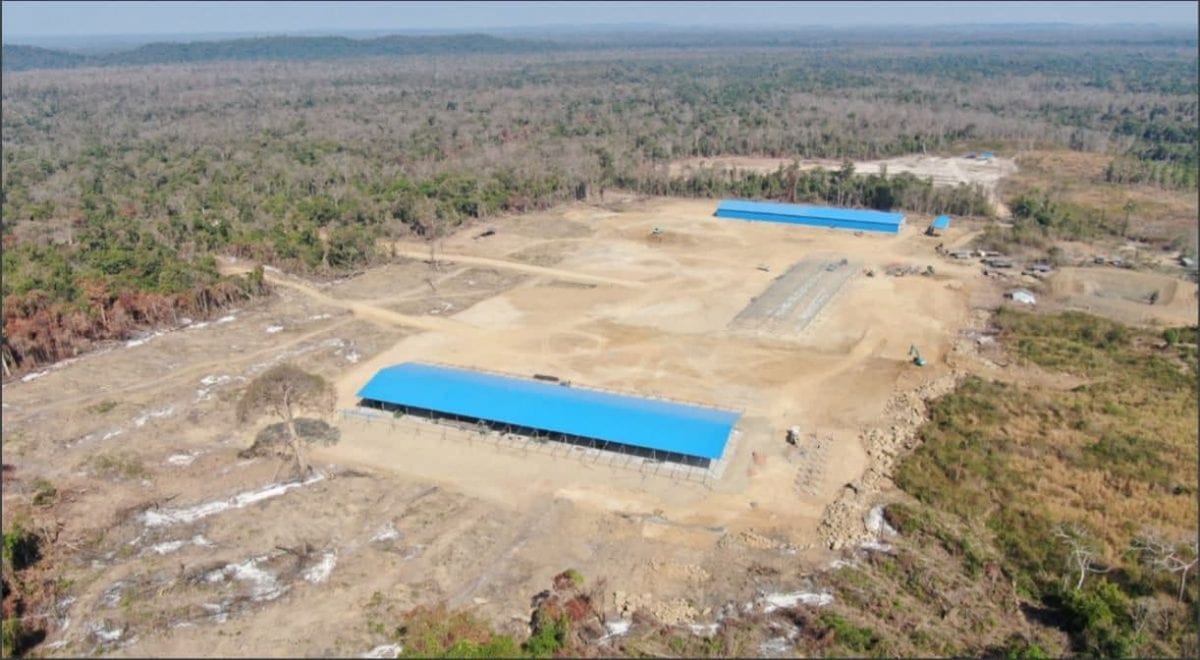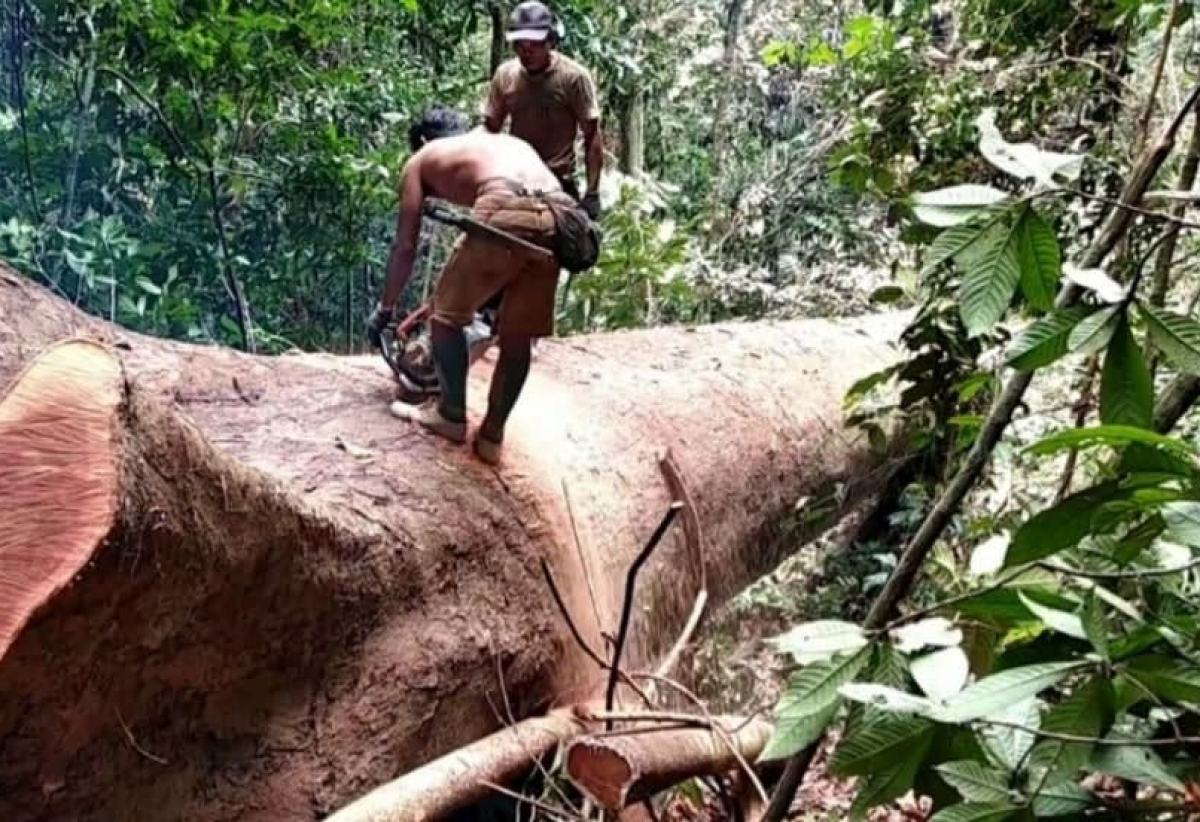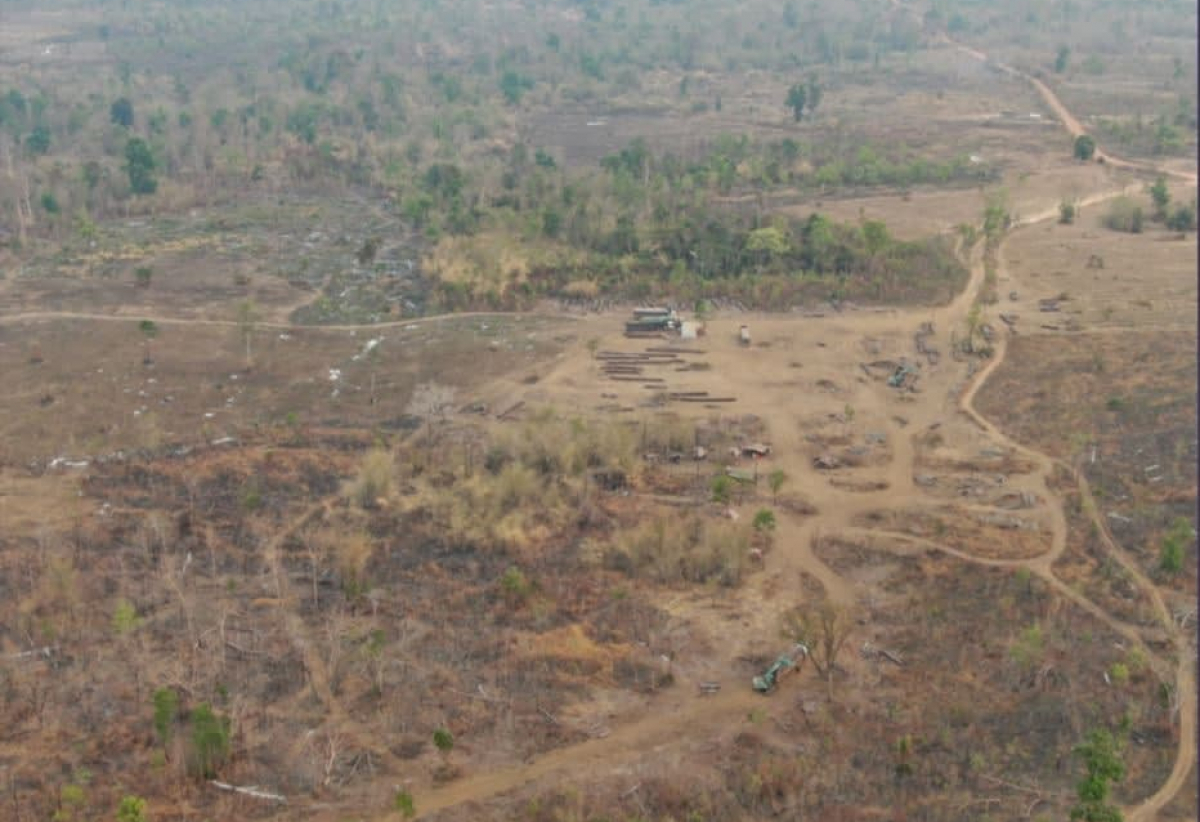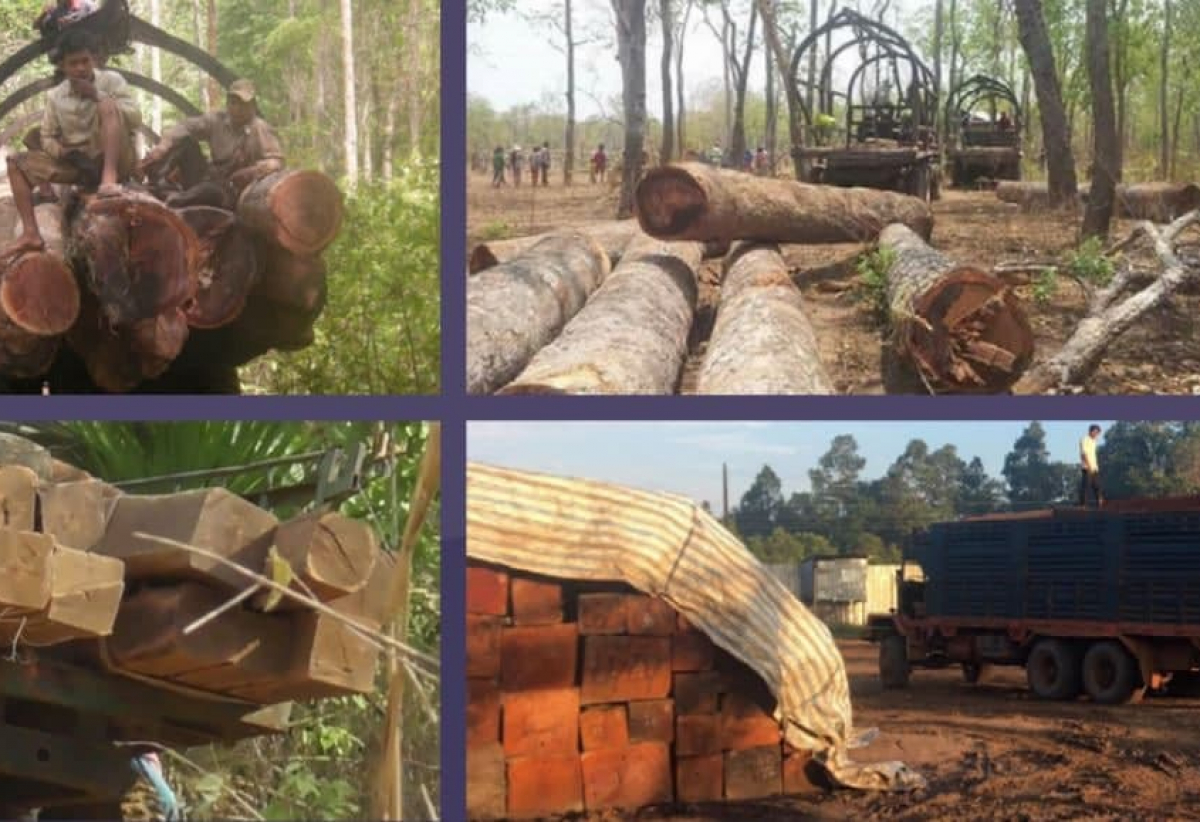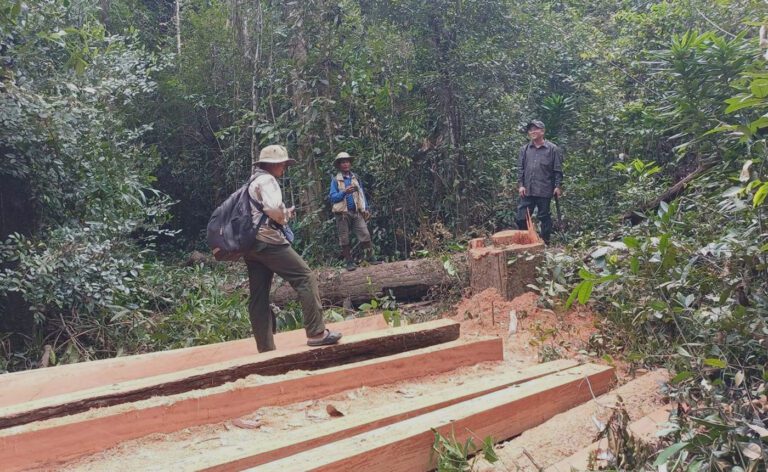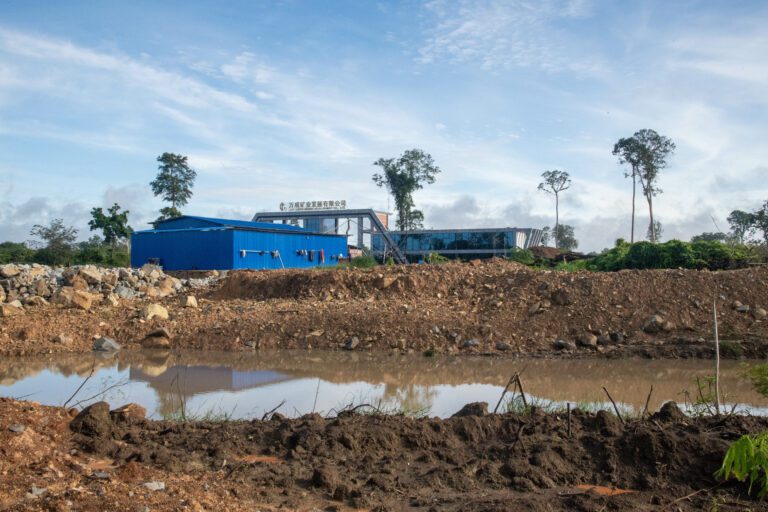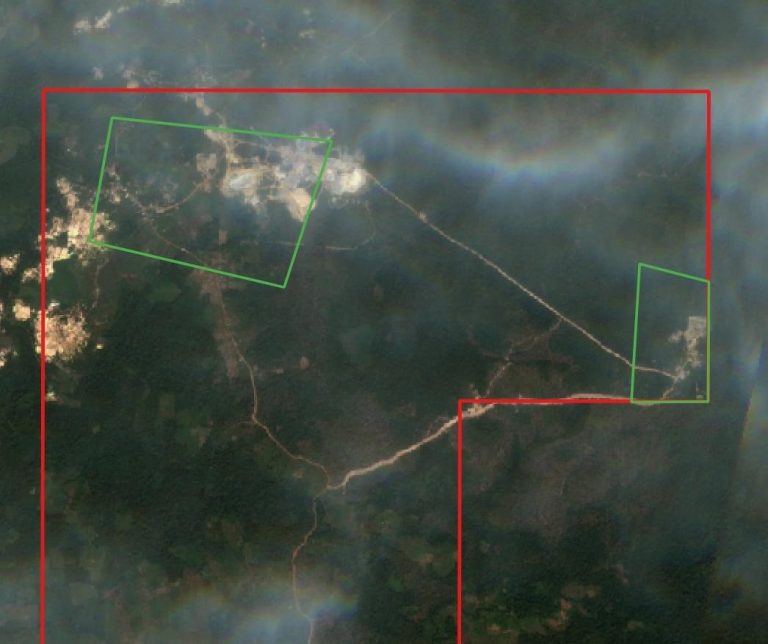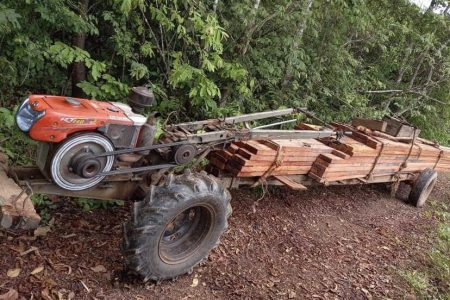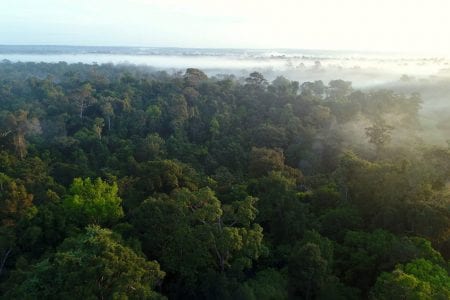An international advocacy group tracking organized crime has accused the Cambodian government of overlooking, and at times actively protecting illegal logging groups driving severe deforestation in the ecologically significant Prey Lang Wildlife Sanctuary.
The Global Initiative Against Transnational Organized Crime, or the Global Initiative, detailed these claims in a report released this week on the mechanics of an illicit supply chain for timber and other ‘luxury’ wood products. In its report, the initiative stated Cambodian government officials are “at the very least providing an accommodating environment for illegal logging operations” in light of frequent reports of wrongdoing by companies regularly accused of illegal logging, mainly Think Biotech and Angkor Plywood. Those two companies, both long-accused of cutting trees in protected areas, have featured prominently in both media and local environmentalist reports of illegal logging.
Ties between illicit timber operations and state officials may be even more developed than simply turning a blind eye, the report suggests.
“There are also signs that [the government] has been more active in protecting the loggers, including making available security personnel from the Kratie provincial military unit for Think Biotech to protect loggers while at work,” the Global Initiative report stated. “Interviews with company workers confirmed that the company protected them from arrest. Rangers also accompanied loggers into the Prey Lang Wildlife Sanctuary, providing official protection for their activities.”
The sanctuary, one of the largest intact forests in the country, is supposed to be safeguarded under Cambodian law. In light of what they see as state inaction to protect Prey Lang, environmental activists and local community organisers have created their own organisations to address forestry crimes. Members of these groups, most notably the Prey Lang Community Network (PLCN), have been arrested by police for allegedly interfering with state patrols in the forest.
PLCN members have routinely faced the threat of violence and imprisonment for their work. Perhaps most infamously, in May 2012, PLCN supporter and noted environmentalist Chut Wutty was shot and killed by military police working with a logging company in the southern Koh Kong province. More recently in 2020, environmental activist Ouch Leng and PLCN members Srey Thei and Khem Soky, as well as forest investigator Man Mat, were arrested by police after making accusations of illegal logging in Prey Lang. That same year, the Ministry of Environment banned the PLCN from entering the protected forest when community and civil society groups attempted to conduct an annual tree blessing ceremony.
When reached for comment by CamboJA, Environment Ministry spokesperson Neth Pheaktra said his ministry has no need to respond to a third party’s report, noting that the ministry has strengthened law enforcement through partnerships with other groups such as local communes. He said the ministry is carrying out an action plan to protect and conserve natural forest resources.
Neither Agriculture Minister Veng Sakhonn, nor his subordinate Keo Omaliss, the director-general at the national Forestry Administration, could be reached for comment.
 A logger cut big a tree in Prey Lang Wildlife Sanctuary, 10 March, 2020.
A logger cut big a tree in Prey Lang Wildlife Sanctuary, 10 March, 2020. A timber depot of the Thy Nga company, 9 March 2020.
A timber depot of the Thy Nga company, 9 March 2020. Felled timber in various stages of transport from Prey Preah Roka and Prey Lang to the Sovann Company sawmill.
Felled timber in various stages of transport from Prey Preah Roka and Prey Lang to the Sovann Company sawmill.
According to estimates from the advocacy group Global Forest Watch, in the years from 2001-18, Cambodia lost 557,000 hectares of tree cover in protected areas, representing a 11.7% loss of the total protected area. Citing those statistics, the Global Initiative report states Cambodia has suffered some of the highest rates of deforestation of any country since the 1970s — a level that has increased significantly in the past decade.
“Some protected areas have been deforested to such an extent that they no longer have much, if any, natural habitat,” the report explained. “This loss has impacted biodiversity conservation and has had a detrimental social and economic effect on the indigenous peoples who depend on the forest.”
The report also notes deforestation is “primarily driven by the large-scale conversion of forest to produce commodities” through state-sanctioned deals to investors organised as either economic land concessions or social land concessions.
At the heart of the illicit timber trade is the ‘laundering’ of timber harvested from protected areas into sawmills handling trees obtained by legal means. Beyond that, the report states illegal timber can also be sold through legal channels through the export process, either by shipping illegally harvested luxury wood under false customs declarations, or by smuggling timber across the border to Vietnam.
“Vietnam plays a significant role in the regional illicit timber trade, and timber smuggling from Cambodia to Vietnam,” the report said.
The report said investigators documented the large-scale illegal harvesting of trees from mid-2018 to mid-2020. Besides Think Biotech and Angkor Plywood, the report cited activities conducted by several companies harvesting timber over a period of years from the Prey Lang and Prey Preah Roka wildlife sanctuaries, where thousands of trees have been illegally harvested into plywood or luxury timber for export.
“These logging operations were almost certainly illegal,” the report concluded, listing companies linked to illegal logging such as Think Biotech, Angkor Plywood, Sam Oeun Sovann Co. Ltd, PNT and Thy Nga.
At least 54 active logging areas were found inside Prey Lang Wildlife Sanctuary, the report stated, adding that a new network of dirt roads built to transport timber were often congested with trucks making the rounds.
In 2020, that trade appeared to intensify even further. The report attributes that in part to movements from the Cambodian government to restrict the activity of non-governmental organisations dedicated to monitoring illegal logging, including the PLCN.
Lu Chu Chang, the director of the Think Biotech, on Thursday denied accusations that his company is illegally logging in protected areas.
“We get the timber from our [legal] concession only, outside the concession we do not [operate],” he said.
Think Biotech is estimated to have generated revenues amounting to $406 million between 2013 and the end of 2019. The company maintains a 34,000 hectare forest restoration site adjacent to protected lands of the Prey Lang Wildlife Sanctuary.
Chu Chang, a Chinese national, said illegal logging does occur within the sanctuary itself but said his company was not involved in it. He said that claims otherwise were “unfair,” adding that unaffiliated groups were responsible for cutting within protected zones. He also said his company is not involved with any illegal exports to either China or Vietnam.
“We have exported legal logging,” he said, “if [it is] illegal timber, how can we pass it by the custom?”
Em Sovanna, a PLCN member from Kratie province, one of the four provinces through which the forest extends, agreed with the findings of the Global Initiative report of illegal logging in protected areas.
“The report is correct,” he said. “We are worried that the forest will be more impacted as the company still cuts.”
He told CamboJA that PLCM continues to monitor timber transports from out of Prey Lang every day and night, but that the Environment Ministry has continuously denied the group’s findings.
“They [officials] dare not confess they might they have a mistake in protecting [forest]” he said.


